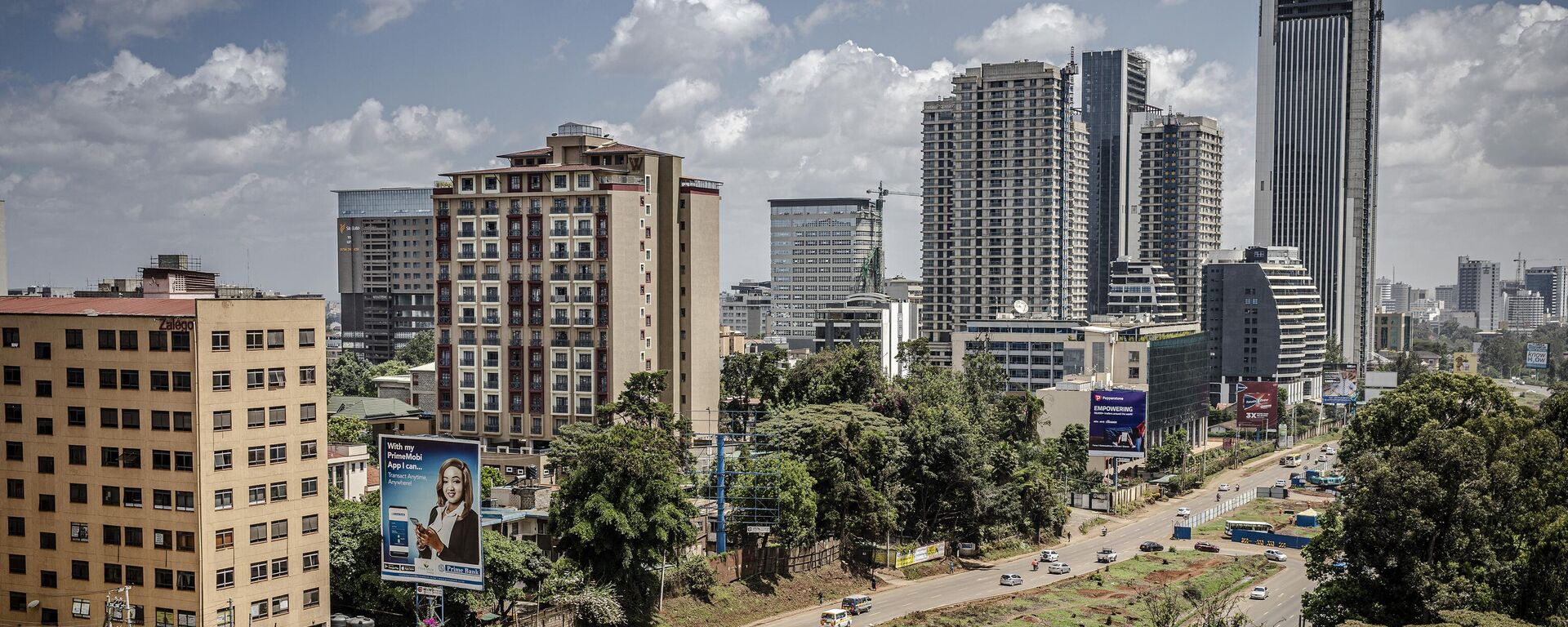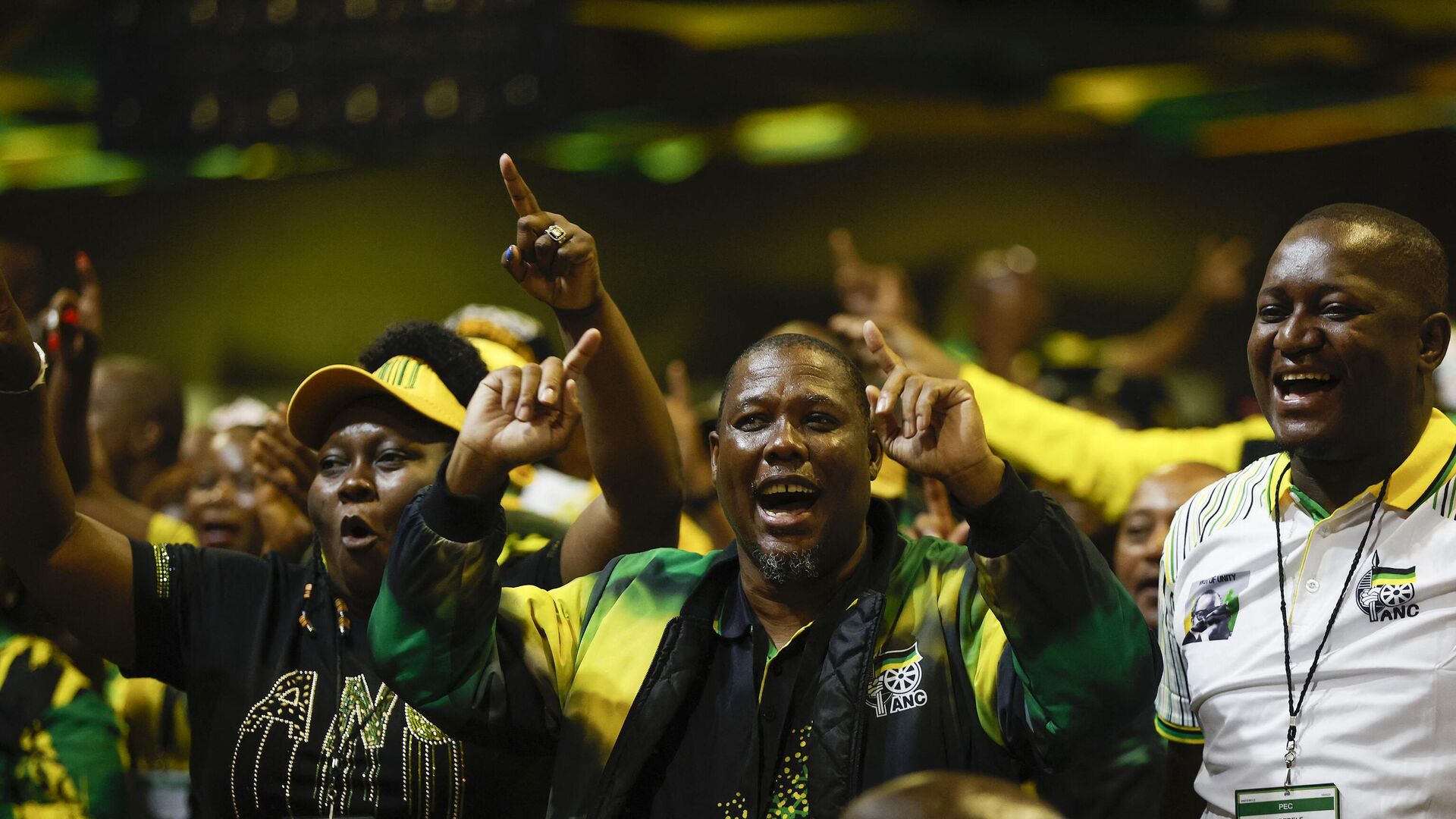https://sputnikglobe.com/20230107/south-africa-what-are-the-results-of-ruling-partys-national-conference-1106098577.html
South Africa: What Are the Results of Ruling Party's National Conference?
South Africa: What Are the Results of Ruling Party's National Conference?
Sputnik International
The African National Congress holds its National Conference every five years to elect members of the National Executive Committee, the party's main decision-making organ. Important policy decisions are also made at the conference.
2023-01-07T10:22+0000
2023-01-07T10:22+0000
2023-01-07T11:20+0000
africa
south africa
southern africa
african national congress (anc)
cyril ramaphosa
land reform
economy
central bank
energy
conference
https://cdn1.img.sputnikglobe.com/img/07e7/01/07/1106097382_0:0:3072:1728_1920x0_80_0_0_0b5204782c0f1b34f728b6eb0303b5aa.jpg
South Africa's ruling party, the African National Congress (ANC) concluded its national conference on Friday. According to media reports, the meeting dedicated to policy changes was initially scheduled to be held in December, when the party's leaders were chosen by its members.However, the policy meeting was postponed because of technical reasons. When it finally took place in January, some economic decisions were declared by the ANC – some new and some reiterations of earlier ones that had not been implemented yet. Among other things, the party reviewed the outcomes of its 6th National Policy Conference, held in July last year.At the conference, the ANC recognized South Africa's energy crisis as the main factor that halts the country's economic development. According to the party, it is necessary to restructure the debt of the state firm ESKOM, which accounts for more than 90 percent of local electricity supply; to develop the energy grid so that new plants can be connected to the network; and to focus on developing green industries such as hydrogen energy and electric cars.South Africa has long suffered an energy crisis that mainly manifests itself in periods of rotating power cuts that have been recurring since 2007.The ANC also considered the topic of how state companies should be run, declaring that government departments should oversee the activities of companies that operate in the corresponding spheres. This contradicts the current principle, according to which, state firms are overseen by the Department of Public Enterprises, which now could be dissolved. This means that, for instance, the Department of Mineral Resources and Energy would be responsible for the operations of ESKOM, and the Department of Transport would oversee the workings of public logistics company Transnet and South African Airways.Such a step could create a certain degree of uncertainty should differences of opinion arise among officials. For example, the energy minister Samson Gwede Mantashe is a critic of green economy transition which is diametrically opposed to the views of President Cyril Ramaphosa.The party also considered the long-discussed question of land reform, announcing new redistribution bills to "facilitate equitable access to land based on the needs of the people of South Africa", enabling the state to buy agricultural land to distribute it to previously underprivileged racial groups. The policy of expropriation of land without compensation, based on possible constitution amendments, which earlier sparked much controversy, is no longer proposed.The ANC also expressed its intention to enhance the role of the country's Reserve Bank and to protect the welfare system "from inflationary pressures", noting that it "should be expanded to provide for basic incomes as fiscal space allows". According to the National Treasury, the Social Relief of Distress program cannot be developed further if no sufficient funding is acquired.To reduce inequality, the ANC proposed introducing steps to contain state debt and establishing a wealth tax.Earlier in mid-December, the main events of the conference resulted in Ramaphosa’s re-election as the party's President and the first ever election of a second secretary-general, turning the National Executive Committee from the party's "Top Six" into the "Top Seven".
https://sputnikglobe.com/20221230/development-innovation--economy-how-far-has-africa-progressed-in-2022---1105888945.html
africa
south africa
southern africa
Sputnik International
feedback@sputniknews.com
+74956456601
MIA „Rossiya Segodnya“
2023
News
en_EN
Sputnik International
feedback@sputniknews.com
+74956456601
MIA „Rossiya Segodnya“
Sputnik International
feedback@sputniknews.com
+74956456601
MIA „Rossiya Segodnya“
anc national conference, south africa land reform, south africa central bank, south africa reserve bank, south africa state companies, south africa welfare, cyril ramaphosa, south africa president, south africa energy crisis, south africa economy
anc national conference, south africa land reform, south africa central bank, south africa reserve bank, south africa state companies, south africa welfare, cyril ramaphosa, south africa president, south africa energy crisis, south africa economy
South Africa: What Are the Results of Ruling Party's National Conference?
10:22 GMT 07.01.2023 (Updated: 11:20 GMT 07.01.2023) The African National Congress holds its national conference every five years to elect members of the National Executive Committee, the party's main decision-making body. Important policy decisions are also made at the conference.
South Africa's ruling party, the African National Congress (
ANC) concluded its national conference on Friday. According to media reports, the meeting dedicated to policy changes was initially scheduled to be held in December, when the party's leaders were chosen by its members.
However, the policy meeting was postponed because of technical reasons. When it finally took place in January, some economic decisions were declared by the ANC – some new and some reiterations of earlier ones that had not been implemented yet. Among other things, the party reviewed the outcomes of its 6th National Policy Conference, held in July last year.
At the conference, the ANC recognized South Africa's
energy crisis as the main factor that halts the country's economic development. According to the party, it is necessary to restructure the debt of the state firm ESKOM, which accounts for more than 90 percent of local electricity supply; to develop the energy grid so that new plants can be connected to the network; and to focus on developing green industries such as hydrogen energy and electric cars.
South Africa has long suffered an energy crisis that
mainly manifests itself in periods of rotating power cuts that have been recurring since 2007.
The ANC also considered the topic of how
state companies should be run, declaring that government departments should oversee the activities of companies that operate in the corresponding spheres. This contradicts the current principle, according to which, state firms are overseen by the Department of Public Enterprises, which now could be dissolved. This means that, for instance, the Department of Mineral Resources and Energy would be responsible for the operations of ESKOM, and the Department of Transport would oversee the workings of public logistics company Transnet and South African Airways.
Such a step could create a certain degree of uncertainty should differences of opinion arise among officials. For example, the energy minister Samson Gwede Mantashe is a critic of green economy transition which is diametrically opposed to the views of President Cyril Ramaphosa.

30 December 2022, 14:24 GMT
The party also considered the long-discussed question of land reform, announcing new redistribution bills to "facilitate equitable access to land based on the needs of the people of South Africa", enabling the state to buy agricultural land to distribute it to previously underprivileged racial groups. The policy of expropriation of land without compensation, based on possible constitution amendments, which earlier sparked much controversy, is no longer proposed.
The ANC also expressed its intention to enhance the role of the country's Reserve Bank and to protect the welfare system "from inflationary pressures", noting that it "should be expanded to provide for basic incomes as fiscal space allows". According to the National Treasury, the Social Relief of Distress program cannot be developed further if no sufficient funding is acquired.
To reduce inequality, the ANC proposed introducing steps to contain state debt and establishing a wealth tax.
Earlier in mid-December, the main events of the conference resulted in Ramaphosa’s
re-election as the party's President and the first ever election of a second secretary-general, turning the National Executive Committee from the party's "Top Six" into the "Top Seven".



